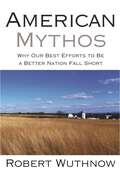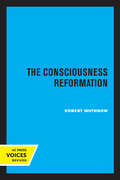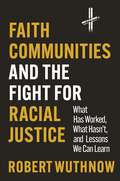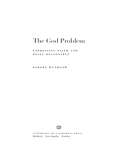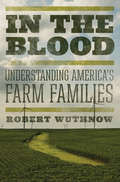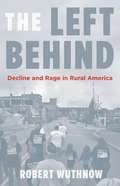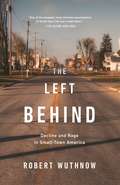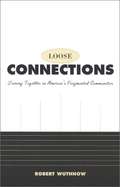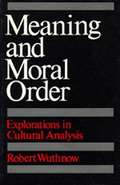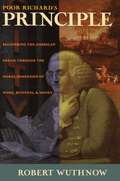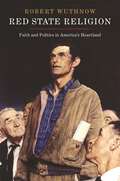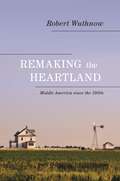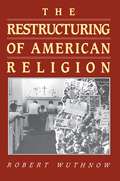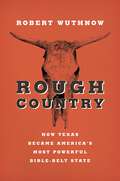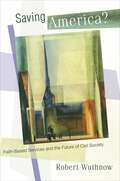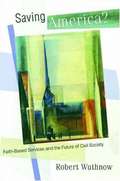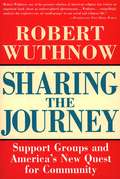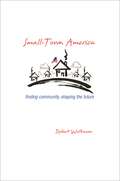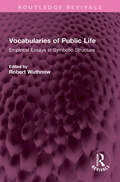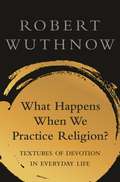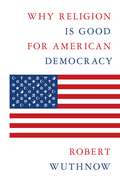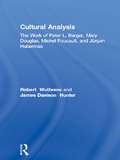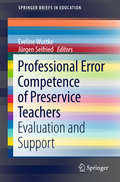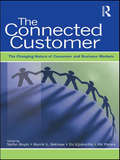- Table View
- List View
American Mythos: Why Our Best Efforts to Be a Better Nation Fall Short
by Robert WuthnowAmerica was built on stories: tales of grateful immigrants arriving at Ellis Island, Horatio Alger-style transformations, self-made men, and the Protestant work ethic. In this new book, renowned sociologist Robert Wuthnow examines these most American of stories--narratives about individualism, immigration, success, religion, and ethnicity--through the eyes of recent immigrants. In doing so, he demonstrates how the "American mythos" has both legitimized American society and prevented it from fully realizing its ideals. This magisterial work is a reflection and meditation on the national consciousness. It details how Americans have traditionally relied on narratives to address what it means to be strong, morally responsible individuals and to explain why some people are more successful than others--in short, to help us make sense of our lives. But it argues that these narratives have done little to help us confront new challenges. We pass laws to end racial discrimination, yet lack the resolve to create a more equitable society. We welcome the idea of pluralism in religion and values, yet we are shaken by the difficulties immigration presents. We champion prosperity for all, but live in a country where families are still homeless. American Mythos aptly documents this disconnect between the stories we tell and the reality we face. Examining how cultural narratives may not, and often do not, reflect the reality of today's society, it challenges readers to become more reflective about what it means to live up to the American ideal.
The Consciousness Reformation
by Robert WuthnowThis title is part of UC Press's Voices Revived program, which commemorates University of California Press’s mission to seek out and cultivate the brightest minds and give them voice, reach, and impact. Drawing on a backlist dating to 1893, Voices Revived makes high-quality, peer-reviewed scholarship accessible once again using print-on-demand technology. This title was originally published in 1976.
Faith Communities and the Fight for Racial Justice: What Has Worked, What Hasn't, and Lessons We Can Learn
by Robert WuthnowThe communities, congregations, and faith-based coalitions that have been working for racial justice over the past fifty yearsHave progressive religious organizations been missing in action in recent struggles for racial justice? In Faith Communities and the Fight for Racial Justice, Robert Wuthnow shows that, contrary to activists&’ accusations of complacency, Black and White faith leaders have fought steadily for racial and social justice since the end of the Civil Rights movement of the 1950s and 1960s. Wuthnow introduces us to the communities, congregations, and faith-based coalitions that have worked on fair housing, school desegregation, affirmative action, criminal justice, and other issues over many years. Often overshadowed by the Religious Right, these progressive faith-based racial justice advocates kept up the fight even as media attention shifted elsewhere.Wuthnow tells the stories of the faith-based affordable housing project in St. Louis that sparked controversy in the Nixon White House; a pastor&’s lawsuit in North Carolina that launched the nation&’s first busing program for school desegregation; the faith outreach initiative for Barack Obama&’s presidential campaign; and church-mobilized protests following the deaths of Trayvon Martin, Freddie Gray, and George Floyd. Drawing on extensive materials from denominations, journalists, and social scientists, Wuthnow offers a detailed and frank discussion of both the achievements and the limitations of faith leaders&’ roles. He focuses on different issues that emerged at different times, tracing the efforts of Black and White faith leaders who sometimes worked cooperatively and more often tackled problems in complementary ways. Taken together, these stories provide lessons in what faith communities have done and how they can better advocate for racial justice in the years ahead.
The God Problem: Expressing Faith and Being Reasonable
by Robert WuthnowThe United States is one of the most highly educated societies on earth, and also one of the most religious. In The God Problem, Robert Wuthnow examines how middle class Americans juggle the seemingly paradoxical relationship between faith and reason. Based on exceptionally rich and candid interviews with approximately two hundred people from various faiths, this book dispels the most common explanations: that Americans are adept at keeping religion and intellect separate, or that they are a nation of "joiners." Instead, Wuthnow argues, we do this--not by coming up with rational proofs for the existence of God--but by adopting subtle usages of language that keep us from making unreasonable claims about God. In an illuminating narrative that reveals the complex negotiations many undertake in order to be religious in the modern world, Wuthnow probes the ways of talking that occur in prayers, in discussions about God, in views of heaven, in understandings of natural catastrophes and personal tragedies, and in attempts to reconcile faith with science.
In the Blood
by Robert WuthnowFarming is essential to the American economy and our daily lives, yet few of us have much contact with farmers except through the food we eat. Who are America's farmers? Why is farming important to them? How are they coping with dramatic changes to their way of life? In the Blood paints a vivid and moving portrait of America's farm families, shedding new light on their beliefs, values, and complicated relationship with the land.Drawing on more than two hundred in-depth interviews, Robert Wuthnow presents farmers in their own voices as they speak candidly about their family traditions, aspirations for their children, business arrangements, and conflicts with family members. They describe their changing relationships with neighbors, their shifting views about religion, and the subtle ways they defend their personal independence. Wuthnow shares the stories of farmers who operate dairies, raise livestock, and grow our fruit and vegetables. We hear from corn and soybean farmers, wheat-belt farmers, and cotton growers. We gain new insights into how farmers assign meaning to the land, and how they grapple with the increasingly difficult challenges of biotechnology and global markets.In the Blood reveals how, despite profound changes in modern agriculture, farming remains an enduring commitment that runs deeply in the veins of today's farm families.
The Left Behind: Decline and Rage in Rural America
by Robert WuthnowHow a fraying social fabric is fueling the outrage of rural AmericansWhat is fueling rural America's outrage toward the federal government? Why did rural Americans vote overwhelmingly for Donald Trump? And, beyond economic and demographic decline, is there a more nuanced explanation for the growing rural-urban divide? Drawing on more than a decade of research and hundreds of interviews, Robert Wuthnow brings us into America's small towns, farms, and rural communities to paint a rich portrait of the moral order--the interactions, loyalties, obligations, and identities—underpinning this critical segment of the nation. Wuthnow demonstrates that to truly understand rural Americans' anger, their culture must be explored more fully. We hear from farmers who want government out of their business, factory workers who believe in working hard to support their families, town managers who find the federal government unresponsive to their communities' needs, and clergy who say the moral climate is being undermined. Wuthnow argues that rural America's fury stems less from specific economic concerns than from the perception that Washington is distant from and yet threatening to the social fabric of small towns. Rural dwellers are especially troubled by Washington's seeming lack of empathy for such small-town norms as personal responsibility, frugality, cooperation, and common sense. Wuthnow also shows that while these communities may not be as discriminatory as critics claim, racism and misogyny remain embedded in rural patterns of life.Moving beyond simplistic depictions of the residents of America's heartland, The Left Behind offers a clearer picture of how this important population will influence the nation's political future.
The Left Behind: Decline and Rage in Small-Town America
by Robert WuthnowHow a fraying social fabric is fueling the outrage of rural AmericansWhat is fueling rural America’s outrage toward the federal government? Why did rural Americans vote overwhelmingly for Donald Trump? And is there a more nuanced explanation for the growing rural-urban divide? Drawing on more than a decade of research and hundreds of interviews, Robert Wuthnow brings us into America’s small towns, farms, and rural communities to paint a rich portrait of the moral order—the interactions, loyalties, obligations, and identities—underpinning this critical segment of the nation. Wuthnow demonstrates that to truly understand rural Americans’ anger, their culture must be explored more fully, and he shows that rural America’s fury stems less from economic concerns than from the perception that Washington is distant from and yet threatening to the social fabric of small towns. Moving beyond simplistic depictions of America’s heartland, The Left Behind offers a clearer picture of how this important population will influence the nation’s political future.
Loose Connections: Joining Together In America's Fragmented Communities
by Robert WuthnowIt has become common to lament Americans' tendency to pursue individual interests apart from any institutional association. But to those who charge that Americans are at home watching television rather than getting involved in their communities, Robert Wuthnow answers that while certain kinds of civic engagement may be declining, innovative new forms are taking their place. <p><p> Acknowledging that there has been a significant change in group affiliations--away from traditional civic organizations--Wuthnow shows that there has been a corresponding movement toward affiliations that respond to individual needs and collective concerns. Many Americans are finding new and original ways to help one another through short-term task-oriented networks. Some are combining occupational skills with community interests in nonprofit and voluntary associations. Others use communication technologies, such as the World Wide Web, to connect with like-minded people in distant locations. And people are joining less formal associations, such as support groups and lobbying efforts, within their home communities. <p> People are still connected, but because of the realities of daily life, they form "loose connections." These more fluid groups are better suited to dealing with today's needs than the fraternal orders and ladies' auxiliaries of the past. Wuthnow looks at the challenges that must be faced if these innovative forms of civic involvement are to flourish, and calls for resources to be made available to strengthen the more constructive and civic dimensions of these organizations. This book helps us to understand and encourage the community spirit of today.
Meaning and Moral Order
by Robert WuthnowGoing beyond classical, neoclassical, and poststructural theories of culture, this innovative, controversial, challenging book will compel scholars to rethink many of the assumptions on which the study of ideology, ritual, religion, science, and culture have been based.
Poor Richard's Principle: Recovering the American Dream through the Moral Dimension of Work, Business, and Money
by Robert WuthnowThe American Dream is in serious danger, according to Robert Wuthnow--not because of economic conditions, but because its moral underpinnings have been forgotten. In the past this vision was not simply a formula for success, but a moral perspective that framed our thinking about work and money in terms of broader commitments to family, community, and humanitarian values. Nowadays, we are working harder than ever, and yet many of us feel that we are not realizing our higher aspirations as individuals or as a people. Here Wuthnow examines the struggles in which American families are now engaged as they try to balance work and family, confront the pressures of consumerism, and find meaning in their careers. He suggests that we can find economic instruction and inspiration in the nation's past--in such figures as Benjamin Franklin, for instance, who was at once the prudent Poor Richard, the engaged public person, and the enthusiastic lover of life. Drawing on first-hand accounts from scores of people in all walks of life and from a national survey, the book shows that work and money cannot be understood in terms of economic theories alone, but are inevitably rooted in our concepts of ourselves and in the symbolic rituals and taboos of everyday life. By examining these implicit cultural understandings of work and money, the book provides a foundation for bringing moral reasoning more fully to bear on economic decisions. It re-examines the moral arguments that were prominent earlier in our history, shows how these arguments were set aside with the development of economistic thinking, and suggests their continuing relevance in the lives of people who have effectively resisted the pressures of greater financial commitments. Demonstrating that most Americans do bring values implicitly to bear on their economic decisions, the book shows how some people are learning to do this more effectively and, in the process, gain greater control over their work and finances. At a time when policymakers are raising questions about the very survival of the American dream, Poor Richard's Principle offers an analysis of how moral restraint can once again play a more prominent role in guiding our thinking.
Red State Religion: Faith and Politics in America's Heartland
by Robert WuthnowWhat Kansas really tells us about red state AmericaNo state has voted Republican more consistently or widely or for longer than Kansas. To understand red state politics, Kansas is the place. It is also the place to understand red state religion. The Kansas Board of Education has repeatedly challenged the teaching of evolution, Kansas voters overwhelmingly passed a constitutional ban on gay marriage, the state is a hotbed of antiabortion protest—and churches have been involved in all of these efforts. Yet in 1867 suffragist Lucy Stone could plausibly proclaim that, in the cause of universal suffrage, "Kansas leads the world!" How did Kansas go from being a progressive state to one of the most conservative?In Red State Religion, Robert Wuthnow tells the story of religiously motivated political activism in Kansas from territorial days to the present. He examines how faith mixed with politics as both ordinary Kansans and leaders such as John Brown, Carrie Nation, William Allen White, and Dwight Eisenhower struggled over the pivotal issues of their times, from slavery and Prohibition to populism and anti-communism. Beyond providing surprising new explanations of why Kansas became a conservative stronghold, the book sheds new light on the role of religion in red states across the Midwest and the United States. Contrary to recent influential accounts, Wuthnow argues that Kansas conservatism is largely pragmatic, not ideological, and that religion in the state has less to do with politics and contentious moral activism than with relationships between neighbors, friends, and fellow churchgoers.This is an important book for anyone who wants to understand the role of religion in American political conservatism.
Remaking the Heartland: Middle America since the 1950s
by Robert WuthnowThe social transformation of the American Midwest in the postwar eraFor many Americans, the Midwest is a vast unknown. In Remaking the Heartland, Robert Wuthnow sets out to rectify this. He shows how the region has undergone extraordinary social transformations over the past half-century and proven itself surprisingly resilient in the face of such hardships as the Great Depression and the movement of residents to other parts of the country. He examines the heartland's reinvention throughout the decades and traces the social and economic factors that have helped it to survive and prosper.Wuthnow points to the critical strength of the region's social institutions established between 1870 and 1950--the market towns, farmsteads, one-room schoolhouses, townships, rural cooperatives, and manufacturing centers that have adapted with the changing times. He focuses on farmers' struggles to recover from the Great Depression well into the 1950s, the cultural redefinition and modernization of the region's image that occurred during the 1950s and 1960s, the growth of secondary and higher education, the decline of small towns, the redeployment of agribusiness, and the rapid expansion of edge cities. Drawing his arguments from extensive interviews and evidence from the towns and counties of the Midwest, Wuthnow provides a unique perspective as both an objective observer and someone who grew up there.Remaking the Heartland offers an accessible look at the humble yet strong foundations that have allowed the region to endure undiminished.
The Restructuring of American Religion: Society and Faith since World War II (Studies in Church and State #2)
by Robert WuthnowThe description for this book, The Restructuring of American Religion: Society and Faith since World War II, will be forthcoming.
Rough Country: How Texas Became America's Most Powerful Bible-Belt State
by Robert WuthnowHow the history of Texas illuminates America's post–Civil War pastTracing the intersection of religion, race, and power in Texas from Reconstruction through the rise of the Religious Right and the failed presidential bid of Governor Rick Perry, Rough Country illuminates American history since the Civil War in new ways, demonstrating that Texas's story is also America’s. In particular, Robert Wuthnow shows how distinctions between "us" and “them” are perpetuated and why they are so often shaped by religion and politics.Early settlers called Texas a rough country. Surviving there necessitated defining evil, fighting it, and building institutions in the hope of advancing civilization. Religion played a decisive role. Today, more evangelical Protestants live in Texas than in any other state. They have influenced every presidential election for fifty years, mobilized powerful efforts against abortion and same-sex marriage, and been a driving force in the Tea Party movement. And religion has always been complicated by race and ethnicity.Drawing from memoirs, newspapers, oral history, voting records, and surveys, Rough Country tells the stories of ordinary men and women who struggled with the conditions they faced, conformed to the customs they knew, and on occasion emerged as powerful national leaders. We see the lasting imprint of slavery, public executions, Jim Crow segregation, and resentment against the federal government. We also observe courageous efforts to care for the sick, combat lynching, provide for the poor, welcome new immigrants, and uphold liberty of conscience.A monumental and magisterial history, Rough Country is as much about the rest of America as it is about Texas.
Saving America?: Faith-Based Services and the Future of Civil Society
by Robert WuthnowOn January 29, 2001, President George W. Bush signed an executive order creating the White House Office of Faith-Based and Community Initiatives. This action marked a key step toward institutionalizing an idea that emerged in the mid-1990s under the Clinton administration--the transfer of some social programs from government control to religious organizations. However, despite an increasingly vocal, ideologically charged national debate--a debate centered on such questions as: What are these organizations doing? How well are they doing it? Should they be supported with tax dollars?--solid answers have been few. In Saving America? Robert Wuthnow provides a wealth of up-to-date information whose absence, until now, has hindered the pursuit of answers. Assembling and analyzing new evidence from research he and others have conducted, he reveals what social support faith-based agencies are capable of providing. Among the many questions he addresses: Are congregations effective vehicles for providing broad-based social programs, or are they best at supporting their own members? How many local congregations have formal programs to assist needy families? How much money do such programs represent? How many specialized faith-based service agencies are there, and which are most effective? Are religious organizations promoting trust, love, and compassion? The answers that emerge demonstrate that American religion is helping needy families and that it is, more broadly, fostering civil society. Yet religion alone cannot save America from the broad problems it faces in providing social services to those who need them most. Elegantly written, Saving America? represents an authoritative and evenhanded benchmark of information for the current--and the coming--debate.
Saving America: Faith-Based Services and the Future of Civil Society
by Robert WuthnowThe author discusses whether congregations are effective vehicles for providing broad-based social programs and whether they are actually fostering the civil society.
Sharing the Journey
by Robert WuthnowA look at how support groups have affected American society argues that, although support groups provide a warmth and security that holds society together, they can lead to an unhealthy self-absorption and a trivialized sense of what is sacred.
Small-Town America: Finding Community, Shaping the Future
by Robert WuthnowA revealing examination of small-town lifeMore than thirty million Americans live in small, out-of-the-way places. Many of them could have joined the vast majority of Americans who live in cities and suburbs. They could live closer to more lucrative careers and convenient shopping, a wider range of educational opportunities, and more robust health care. But they have opted to live differently.In Small-Town America, we meet factory workers, shop owners, retirees, teachers, clergy, and mayors—residents who show neighborliness in small ways, but who also worry about everything from school closings and their children's futures to the ups and downs of the local economy. Drawing on more than seven hundred in-depth interviews in hundreds of towns across America and three decades of census data, Robert Wuthnow shows the fragility of community in small towns. He covers a host of topics, including the symbols and rituals of small-town life, the roles of formal and informal leaders, the social role of religious congregations, the perception of moral and economic decline, and the myriad ways residents in small towns make sense of their own lives. Wuthnow also tackles difficult issues such as class and race, abortion, homosexuality, and substance abuse.Small-Town America paints a rich panorama of individuals who reside in small communities, finding that, for many people, living in a small town is an important part of self-identity.
Vocabularies of Public Life: Empirical Essays in Symbolic Structure (Routledge Revivals)
by Robert WuthnowFirst published in 1992, Vocabularies of Public Life explores the revolution that has taken place in our understanding of contemporary culture and decodes a number of the symbols which now dominate public life. Wuthnow divides the essays collected here into three distinct ‘vocabularies.’ Part I examines the ways in which religious and scientific languages function as vocabularies of conviction in public life, Part II focuses on music and art as vocabularies of expression, and Part III considers law, ideology, and public policy as vocabularies of persuasion. The contributors discuss such diverse subjects as American spiritualism, the syntax of modern dance and the social contexts of number one songs. What unifies the book is the common concern with the concrete, everyday manifestations of culture and the importance of understanding its basic structure. This book will be of interest to specialists and scholars of various disciplines such as linguistics, literature, media studies, popular culture, and sociology.
What Happens When We Practice Religion?: Textures of Devotion in Everyday Life
by Robert WuthnowAn exploration of the interdisciplinary methods used to understand religious practiceReligion is commonly viewed as something that people practice, whether in the presence of others or alone. But what do we mean exactly by "practice"? What approaches help to answer this question? What Happens When We Practice Religion? delves into the central concepts, arguments, and tools used to understand religion today.Throughout the past few decades, the study of religion has shifted away from essentialist arguments that grandly purport to explain what religion is and why it exists. Instead, using methods from anthropology, psychology, religious studies, and sociology, scholars now focus on what people do and say: their daily religious habits, routines, improvisations, and adaptations. Robert Wuthnow shows how four intersecting areas of inquiry—situations, intentions, feelings, and bodies—shed important light on religious practice, and he explores such topics as the role of religious experiences in sacred spaces, gendered social relationships, educational settings, the arts, meditation, and ritual.Suitable for undergraduate and graduate courses, What Happens When We Practice Religion? provides insights into the diverse ways that religion manifests in ordinary life.Summarizes the latest theories and empirical methods of religious practiceShows how the study of religion has changedIncludes chapters on theory, situations, intentions, feelings, and bodiesDraws from anthropology, psychology, religious studies, and sociologyAccessible for undergraduate and graduate courses
Why Religion Is Good for American Democracy
by Robert WuthnowHow the actions and advocacy of diverse religious communities in the United States have supported democracy’s development during the past centuryDoes religion benefit democracy? Robert Wuthnow says yes. In Why Religion Is Good for American Democracy, Wuthnow makes his case by moving beyond the focus on unifying values or narratives about culture wars and elections. Rather, he demonstrates that the beneficial contributions of religion are best understood through the lens of religious diversity. The religious composition of the United States comprises many groups, organizations, and individuals that vigorously, and sometimes aggressively, contend for what they believe to be good and true. Unwelcome as this contention can be, it is rarely extremist, violent, or autocratic. Instead, it brings alternative and innovative perspectives to the table, forcing debates about what it means to be a democracy.Wuthnow shows how American religious diversity works by closely investigating religious advocacy spanning the past century: during the Great Depression, World War II, the civil rights movement, the debates about welfare reform, the recent struggles for immigrant rights and economic equality, and responses to the coronavirus pandemic. The engagement of religious groups in advocacy and counteradvocacy has sharpened arguments about authoritarianism, liberty of conscience, freedom of assembly, human dignity, citizens’ rights, equality, and public health. Wuthnow hones in on key principles of democratic governance and provides a hopeful yet realistic appraisal of what religion can and cannot achieve.At a time when many observers believe American democracy to be in dire need of revitalization, Why Religion Is Good for American Democracy illustrates how religious groups have contributed to this end and how they might continue to do so despite the many challenges faced by the nation.
Cultural Analysis: The Work of Peter L. Berger, Mary Douglas, Michel Foucault, and Jürgen Habermas (Routledge Library Editions: Michel Foucault)
by Robert Wuthnow James Davison Hunter Albert J. Bergesen Edith KurzweilFirst published in 1984, Cultural Analysis is a systematic examination of the theories of culture contained in the writings of four contemporary social theorists: Peter L. Berger, Mary Douglas, Michel Foucault, and Jürgen Habermas. This study of their work clarifies their contributions to the analysis of culture and shows the converging assumptions that the authors believe are laying the foundation for a new approach to the study of culture. The focus is specifically on culture, a concept that remains subject to ambiguities of treatment, and concentrates on questions concerning the definition and content of culture, its construction, its relations with social conditions, and the manner in which it may be changing. The books demonstrates how these writers have made strides towards defining culture as an objective element of social interaction which can be subjected to critical investigation.
Professional Error Competence of Preservice Teachers
by Eveline Wuttke Jürgen SeifriedThis book discusses competence, teacher competence, and professional error competence of teachers, and emphasizes the need for a training programme that supports the latter. The book starts out by presenting results from previous studies that underline the necessity to train professional error competence of teachers, especially in the field of accounting. The studies analysed include research in the field of accounting, and on the efficacy of teacher training. Next, considerations on training programmes are presented. From these analyses, a training programme was designed to support professional error competence in accounting. This training programme aims for increased knowledge about students' errors (content knowledge) and offers strategies to handle these errors (pedagogical content knowledge). Both are central facets of professional error competence. The book describes the development, characteristics, implementation, and evaluation of this programme. It details the test platform that was developed and used for the assessment of professional error competence, and critically discusses the results from the evaluation of the training programme from various perspectives. The current discussion on teacher training and expertise is influenced by empirical results obtained in international large-scale studies such as PISA and TIMSS. The findings of the studies underpin the discussion on teaching quality and teachers' professional competences. The key issue is that teacher competence has an impact on teaching quality and this, in turn, influences students' achievements. International comparative studies reveal that teachers often lack central competence facets, and therefore it is assumed that standard teacher training programmes may fail to successfully prepare student teachers for their tasks. Therefore, customized training programmes are currently being discussed. Their focus is mostly on pedagogical content knowledge and classroom practices, because these competence facets are essential for teaching quality.
The Connected Customer: The Changing Nature of Consumer and Business Markets
by Stefan Wuyts Marnik G. Dekimpe Els Gijsbrechts Rik PieteIn today’s connected consumer environment, customers are better informed and harder to please, but they also leave a more visible evidence trail in the form of improved databases and customer information. Consumers are increasingly interconnected through various sorts of social networks, a trend that is facilitated by recent advances in electronic media and telecommunication (i.e., MySpace, Facebook, Twitter and Cyworld). Consumers are also increasingly connected with brands and seek to play a more participative role in their relationship with companies, stimulating companies to reconsider how to connect with consumers. This book consists of a collection of chapters by thought-leaders in the field of marketing and beyond that deals with the rich facets of connectivity. This edited volume is a great source of research ideas and fresh theory building for academics and students in marketing and related fields who wish to understand this exciting field. It will be a source of inspiration for practitioners who are eager to take up the challenge and adapt their marketing strategies to the changing nature of consumer and business markets.
The Cambridge Companion to the Italian Renaissance
by Michael WyattThe Renaissance in Italy continues to exercise a powerful hold on the popular imagination and on scholarly enquiry. This Companion presents a lively, comprehensive, interdisciplinary, and current approach to the period that extends in Italy from the turn of the fourteenth century through the latter decades of the sixteenth. Addressed to students, scholars, and non-specialists, it introduces the richly varied materials and phenomena as well as the different methodologies through which the Renaissance is studied today both in the English-speaking world and in Italy. The chapters are organized around axes of humanism, historiography, and cultural production, and cover a wide variety of areas including literature, science, music, religion, technology, artistic production, and economics. The diffusion of the Renaissance throughout Italian territories is emphasized. Overall, the Companion provides an essential overview of a period that witnessed both a significant revalidation of the classical past and the development of new, vernacular, and increasingly secular values.
